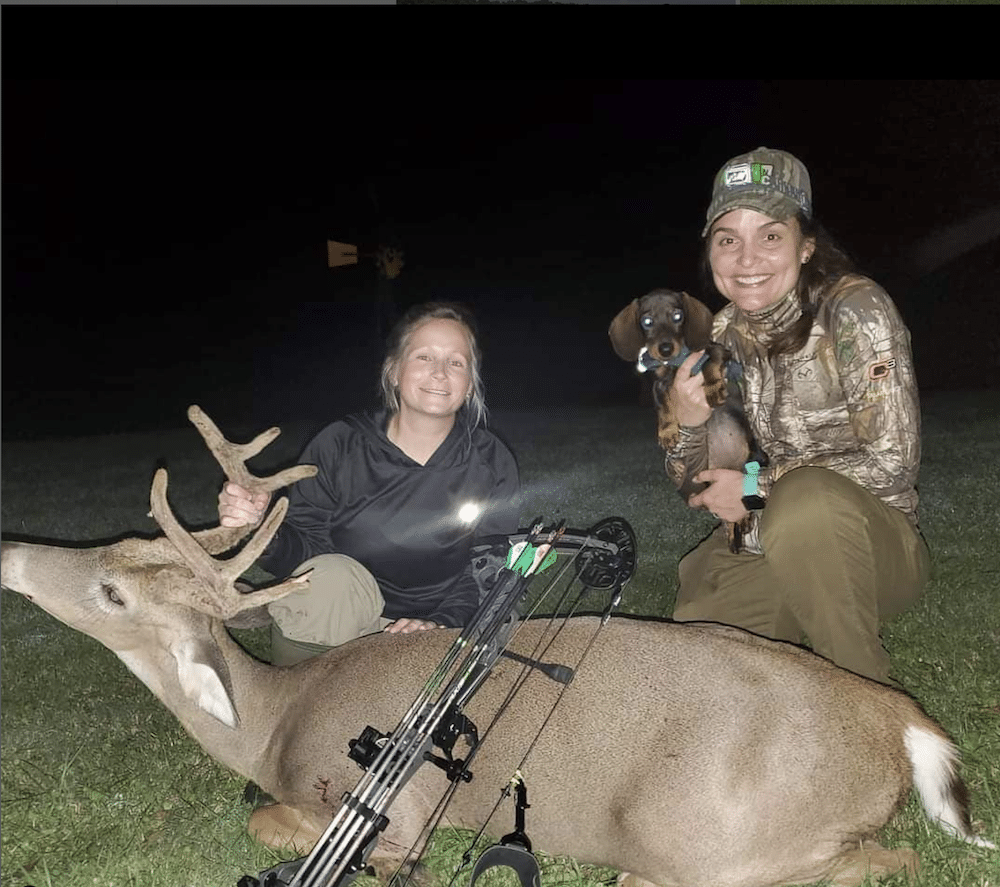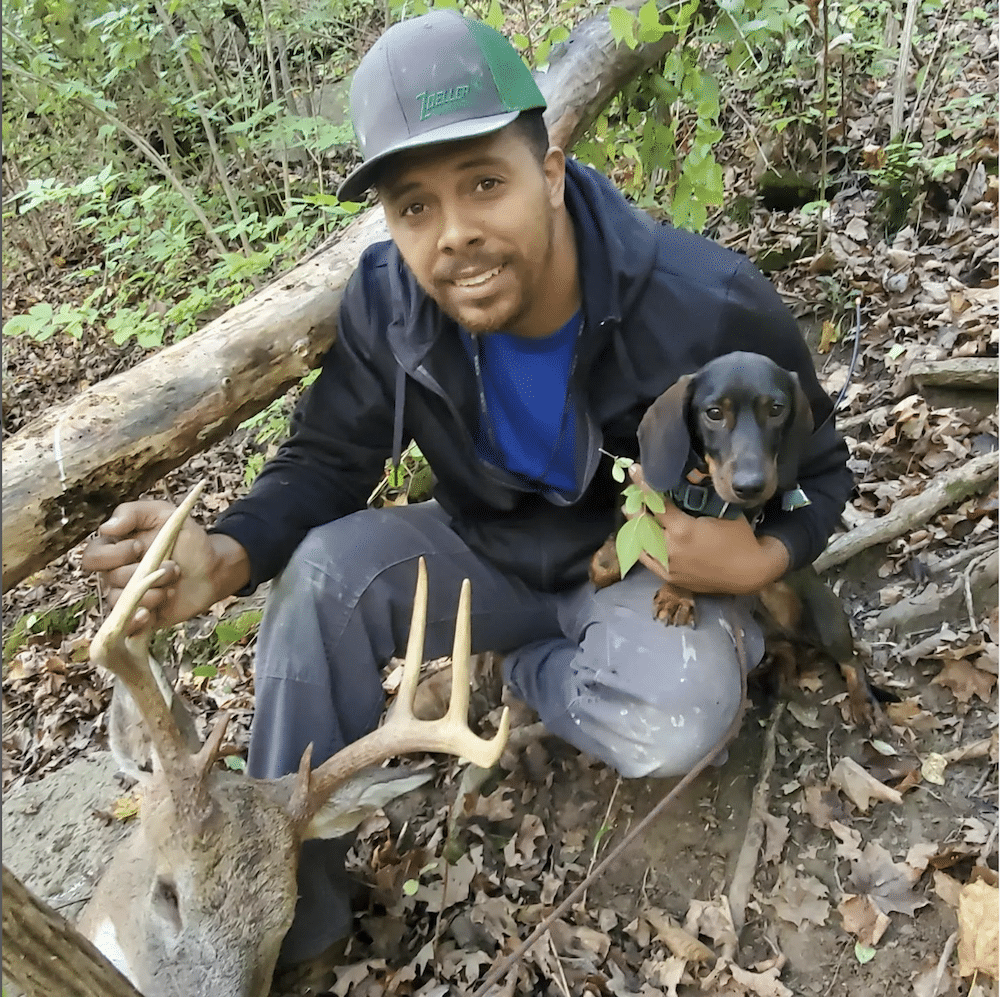Bowhunting teaches valuable lessons. It requires practice, persistence and the ability to overcome unexpected obstacles. Bowhunters often possess a certain amount of grit. The skills developed through bowhunting can often be applied to everyday life.
Rachel Crume, a 38-year-old bowhunter from Louisville, Kentucky, understands the unexpected obstacles of life and bowhunting. She spends as much time as possible in the woods as a passionate outdoor enthusiast. She also spends a lot of time outside with her career at the Kentucky Department of Fish and Wildlife Resources. When she began experiencing unusual health symptoms, she initially didn’t think her time outside was to blame.
About three years ago, Crume began having a lot of digestive issues. She tried to feel better through a series of elimination diets, but they didn’t work. She was eventually diagnosed with alpha-gal syndrome, also known as the red meat allergy or tick-bite meat allergy. Alpha-gal typically starts with the bite of the Lone Star tick. During the bite, the tick transfers a sugar molecule into the human’s body. This causes a reaction in the body that creates a mild to severe allergic reaction to red meat. It can also cause allergies to other foods from mammals like dairy products. There is no cure.
Crume is unsure when the tick bite that gave her alpha-gal occurred. She says she removes several ticks a year from her body, despite taking all the precautions like treating her clothes with permethrin and wearing long sleeves and pants. She believes the syndrome is on the rise in her area. She has several friends in Kentucky who are hunters and also have alpha-gal.
Crume has never experienced anaphylaxis, a severe and potentially life-threatening allergic reaction to red meat. However, red meat makes her sick, so she’s had to eliminate it from her diet. As a hunter, that’s been hard both physically and mentally.
“It does feel a little bit differently because I think that’s the icing on the cake,” Crume said. “You work your butt off to try to harvest an animal and you want to share it with your friends and family over a meal.”
Crume still gets to share her success with others. She often donates red meat she harvests to Hunters Against Hunger, a program that allows hunters to donate wild game meat to people in need. But Crume doesn’t bowhunt as much anymore. It’s partly due to alpha-gal, but it’s mostly because of another unexpected obstacle that eventually turned into a blessing.
In early 2020, just as the world was about to turn upside down due to the COVID-19 pandemic, Crume’s life was upended. During a routine checkup, her doctor noticed something.
“She’s like, ‘I’m sure this is nothing but we’re going to rule it out,” Crume said. It wasn’t nothing. It turned out to be early-stage breast cancer. Crume was only 35 at the time. But Crume is a fighter. In that moment she decided a life-changing diagnosis would change her life for the better.

Crume, on the right, holding Sookie, refers to her as “the biggest blessing.” Photo Credit: Sookie the Deer Dog
“I got my blood-tracking dog and that has been the biggest blessing for me,” Crume said.
Facing two cancer removal surgeries and 30 radiation treatments, Crume jokes that she used her cancer as a bargaining chip with her husband to get her dream dog. For years, Crume had wanted to get a blood-tracking dog, but the pair already owned a Lab and her husband wanted just one dog in the house at a time. But once she started her cancer journey, Crume knew she needed some additional support, and a four-legged family member fit the bill.
“In the very middle of my radiation treatments I hopped in my car and drove to Alabama and picked her up,” Crume said.
Sookie is a wire-haired dachshund. She’s fittingly named after the main character in True Blood, a series about vampires. Sookie was often allowed to visit Crume during her radiation treatments. These took place at the height of the COVID-19 pandemic, when patients often felt scared and isolated. Crume says Sookie brought joy to her and many other patients.
“It pretty much sucked during treatments,” Crume said. “Sookie was a big help. I could focus on her.”
Cancer treatment kept Crume from bowhunting that year. But it gave her the time she needed to train Sookie for her first tracking season.
“I don’t know if years prior I would have put in the amount of time that you really need to have a good tracking dog,” Crume said. “She knows her job. That’s what she was bred for. But it’s my job to read her, and that’s just time spent behind her.”
Crume read books, trained with friends and joined tracking groups like United Blood Trackers. By fall, Sookie and Crume were ready. Crume expected to take the pup on a handful of training tracks for friends and family. But the duo ended the season on 47 tracking jobs.
Crume fell in love with tracking. As a bowhunter, she knows the heartbreak that can come when you’re left wondering if you’ll recover an animal. That’s when hunters call blood-tracking dogs and their handlers.

Crume shares Sookie’s talents with other hunters and helps them recover their deer. Photo Credit: Sookie the Deer Dog
“As a hunter first, I know what it takes to even get the opportunity for a shot,” Crume said. “When people are calling me for a track, you can’t be any more upset because you get that opportunity and then it doesn’t work out how you want it to. If we can help make that a happy story at the end, that’s great.”
Crume says following a track is like assembling a puzzle. “We’ll look at all the evidence to put it together.”
Crume asks the hunter a series of questions designed to get as much information as possible about what happened. Even if the animal isn’t recovered, Crume says she can usually provide answers to the hunter about the outcome.
Crume welcomes the obstacles that come with blood tracking. She’s also conquering her health ones. She’s cancer-free and monitoring her alpha-gal levels annually.
“Hopefully they eventually get low enough to where I can start introducing red meat back into my diet, but everybody is different,” Crume said.
While everyone faces different challenges in life, Crume proves that sometimes the hardest hurdles lead to the biggest blessings.